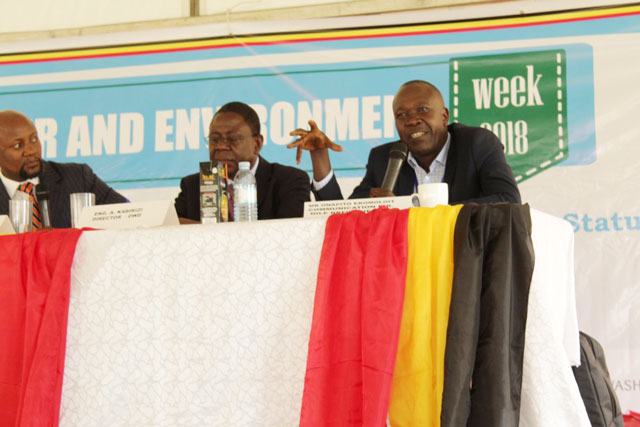
Other speakers concurred with Dr Muhumuza, with each one of them emphasizing the economic importance of water and environment.
The Director, Directorate of Water Resources, Florence Adongo noted that while it’s been 25 years since Uganda adopted Integrated Water Resources Management (IWRM) approach, Uganda’s renewable water resources have continued to dwindle and the quality of water to decline. She called upon participants to use this week to reflect on the human activities that have catalyzed such trends.
The UNDP Representative and Lead of the Environment and Natural Resources (ENR) Development partners Onesmus Muhwezi also said that if Ugandans don’t protect wetlands and forests, they will not achieve, the SDGs and NDPII Goals. “We need to account for our natural capital. We need to invest in water resources management and increase sector financing by about six times, “ he said.
Speaking on behalf of Austrian Development Cooperation and development partner for Water and Sanitation, Guenter Engelits noted that given Uganda’s rapid population growth, estimated to reach 80 million by 2040, the environment and natural resources must be preserved and protected.
“By 2040 there will be 80 million people in Uganda. They will need the environment. Currently, the environment is not just under threat, it is being destroyed,” he said. He observed that it had been reported that investing in water and environment can increase GDP per capita by 9%.
All speakers shared the conviction that Uganda has not invested enough financial resources in water and environment sector, given its importance and linkages to all sectors in the economy.
On his part, Dr Muhumuza recommended that sector actors invest in equality to ensure that even water-stressed areas are served; optimal regional allocation of resources to tap into regions that have a comparative natural resources advantage; and harmonization of approaches.
A panel of experts constituted to reflect on Muhumuza’s assertion that it would be wise to invest in the water and environment sector advised government to put people at the cenre of all interventions.
“You need to involve people in this debate. People are poor but they will never own water if they don’t contribute to discussions and processes. Get the people involved if you want the debate to become truly national,” panelist Onapito Ekomoloit proposed.
Julius Mukunda of CSBAG suggested that citizens can start by contributing to closing the funding gap that has been identified in the Sector Strategic Investment Plan.
“We need to understand that this is not a welfare country. If we need 7.2 trillion there must be deliberate steps to raise the money. More than 80% of water management is by the community. Even if every community member brings one shilling, we shall move forward.”
Muhumuza proposed that government should not be afraid of owning up to its weaknesses.
“Government must stop pretending that it can find all the money it requires. Face reality and agree that Ugandans need to contribute,” he said.
He noted that government resources are getting more constrained and it’s time to rethink resource mobilization strategies. He said that if civil servants are afraid of rocking the boat, they should share information with civil society actors who will then speak out.
The week started on Saturday with a Sanitation clean up exercise at Kagugube Makerere Kivulu zone in Kampala.
#happeningnow Sanitation week cleanup in Kagugube Kivulu. #UWEWK Theme: Water and Environment; A Catalyst for achieving Middle income status. @CateNimanya @achiro_brenda @Mawejje_Nyanzi @waterforpeople @KCCAUG @min_waterUg pic.twitter.com/QHMUQmfs16
— Water For People UGA (@Water4PeopleUG) March 17, 2018
 The Independent Uganda: You get the Truth we Pay the Price
The Independent Uganda: You get the Truth we Pay the Price



